2014 TESOL Advocacy & Policy Summit Participation Increases
 In June, TESOL hosted its ninth annual 2014 TESOL Advocacy & Policy Summit in Washington, DC. The event was sponsored, in part, by the American Federation of Teachers and the National Education Association. Attendance at this year’s summit was the highest to date. More than 60 association members, affiliate members, and other TESOL professionals joined the 2-day event. Participants came from across the United States, and a few came from other countries.
In June, TESOL hosted its ninth annual 2014 TESOL Advocacy & Policy Summit in Washington, DC. The event was sponsored, in part, by the American Federation of Teachers and the National Education Association. Attendance at this year’s summit was the highest to date. More than 60 association members, affiliate members, and other TESOL professionals joined the 2-day event. Participants came from across the United States, and a few came from other countries.
The first day featured full a day of issue briefings and activities around education legislation and advocacy, and on the second day, the newly trained advocates visited congressional offices on Capitol Hill. By the end of the event, TESOL members had visited the offices of more than 100 senators and representatives.
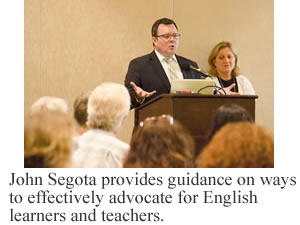
The goal of the summit, however, was not only to lobby members of Congress on issues relevant to English language teachers and their students. “The Advocacy and Policy Summit is at its core an educational opportunity. Participants come to Washington, DC, and learn how to effectively advocate for English learners,” noted TESOL Associate Executive Director John Segota. “The goal of the program is not only to educate attendees on key policies but also to empower them to take action in their local school districts and workplaces.”
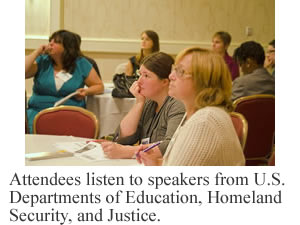
The issue briefings kicked off on Monday morning with speakers Carlos Martinez and Emily Davis from the U.S. Department of Education (USDE). Martinez provided a general overview and update from the Office of English Language Acquisition, and Davis, an ESL teacher and a Teaching Ambassador Fellow, discussed teacher preparation and USDE’s teacher quality initiatives.
Other presentations included a discussion from the U.S. Department of Justice on the civil rights of English learners, a Student & Exchange Visitor Program update from the U.S. Department of Homeland Security, an overview of Common Core State Standards and ELLs, and an update on programs for adult English language learners from the Office of Career, Technical, and Adult Education.
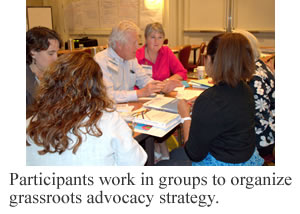
After the briefings, the summit focused on advocacy. Participants engaged in a series of activities to help them learn more about advocacy and prepare them to meet with their members of Congress. To maximize the impact of the summit, participants were also encouraged to meet with key members of Congress serving on the education and appropriations committees, and participants from the same state were encouraged to meet with legislators in small groups.
On Tuesday, the advocates went to Capitol Hill to meet with members of Congress and their staffers. After their meetings, the advocates shared their experiences.
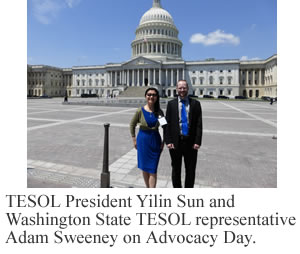
“Coming in to the summit, I was hesitant about my potential efficacy because of my lack of experience in advocacy,” noted Yurimi Grigsby, a first-year advocate from Illinois TESOL. “I found that my actual professional and life experience were enough for what I needed…to share the stories of the English learners I work with every day. Feeling connected to a wider community fighting for the same better world was exhilarating, especially coupled with the excitement and electricity on Capitol Hill.”
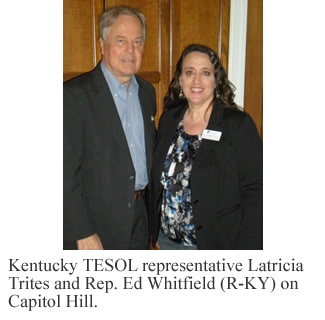
Beverly Good, a returning advocate from Ohio TESOL, said that that she left the 2013 program feeling energized. When she returned to Ohio last year, she initiated advocacy-oriented conversations within Ohio TESOL and visited Ohio state elected officials, most notably the Ohio Latino Commission. “Ohio TESOL has done more for advocacy in the last year than any time since I've been involved with the Board,” Good wrote. “Everything that we have done is a direct result of attending the 2013 and 2014 Advocacy and Policy Summits. You showed us how to get started and stay with the program. Keep up the great work.”
Read TESOL President Yilin Sun’s blog for her account of the event. For information on the 2015 TESOL Advocacy & Policy Summit, please visit the event page on the TESOL website.
TESOL Blogs
Interested in writing a blog for TESOL?
Contact
Tomiko Breland with your idea or for submission details.
Check out the latest TESOL Blogs:
|
Focus on Cultural Education: A Writing Activity, by Elena Shvidko
 Living in a foreign country can be difficult if one doesn’t understand many of the cultural concepts that “locals” sometimes use on a daily basis. When I came to the United States a few years ago, I realized how little I knew about the American culture. I appreciated people who were willing to help me and contribute to my “cultural education.” Living in a foreign country can be difficult if one doesn’t understand many of the cultural concepts that “locals” sometimes use on a daily basis. When I came to the United States a few years ago, I realized how little I knew about the American culture. I appreciated people who were willing to help me and contribute to my “cultural education.”
Accordingly, I am curious sometimes if our students are aware of the meanings, let alone the history, of the cultural concepts that they encounter during classroom activities or in readings. Read More. |
|
Student-Generated Grammar Rules, by Alexandra Lowe
 As ESL instructors, we often learn at least as much from our students as they do from us. But that truism was borne out in an unexpected way recently in my beginners’ evening ESL class as we wrestled, in time-honored fashion, with the simple past. As ESL instructors, we often learn at least as much from our students as they do from us. But that truism was borne out in an unexpected way recently in my beginners’ evening ESL class as we wrestled, in time-honored fashion, with the simple past.
My students had gamely participated in a number of tried-and-true communicative activities designed to help them practice one of the trickiest skills: forming questions in the simple past. Avid futbol fans, they had interviewed each other about the 2014 World Cup results using prompts that I had helped them generate: Did Brazil lose? Did Germany win? Did Argentina beat the Netherlands? What was the score? Read More. |
|
Socrative: A New Student Response System, by Tara Arntsen
 Do you like the idea of exit slips, but don’t have time to grade them all outside of class? Do you find yourself wondering whether or not students caught the main point of your lecture? Do you wish you could go paperless for quizzes and other activities or even just reduce the amount of paper you use? Do you want to engage your students more with your lessons? Do you like the idea of exit slips, but don’t have time to grade them all outside of class? Do you find yourself wondering whether or not students caught the main point of your lecture? Do you wish you could go paperless for quizzes and other activities or even just reduce the amount of paper you use? Do you want to engage your students more with your lessons?
Well, if your students have smartphones, tablets, or computers in class, then Socrative can help you out. Socrative is free! I registered from my desktop in 30 seconds by entering my e-mail address and a password and then downloaded both the student and teacher versions of the app onto my iPad to test the system out. I was amazed at how easy everything was, and the possibilities really seem endless. Read More. |
|
ESL Games: Name 5, by Marc Anderson
 The Game: Name “5” is a highly motivating game that provides amusement and interest while giving practice to vocabulary and speaking skills. This game encourages students to interact and communicate. The Game: Name “5” is a highly motivating game that provides amusement and interest while giving practice to vocabulary and speaking skills. This game encourages students to interact and communicate.
Research Says: It has been proven that “…learning vocabulary through games is one effective and interesting way that can be applied in any classroom. Games such as this are used for practice and review of language lessons, thus leading toward the goal of improving learners’ communicative competence” (Asian EFL Journal, Dec. 2003, N. Thi Thank Huyen & K. Thi Thu Nga). Read More. |